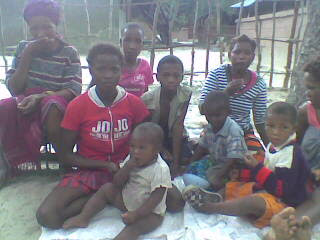Monday, March 30, 2009
Driving on the other side
A traditional dress
wearing traditional dresses. The dress is that of
the Herero women.Namibia is made up of
several of what they call, tribes.
Some other tribes are the majority Ovambo,
then Kovangos, Damara, Nama, Caprivian, Bushmen,
Baster, Tswana and Himba. Also a few others that I
don't know the names of.
I do hope that in the future I'll be able to post up
others pictures of traditional dress.
Friday, March 27, 2009
Okahandja Home Based Care
to see the Okahandja Home Based Care
facilities. It is part of becoming aware of
the different types of services that exist in
certain areas of Nambia.
The lady on the right in the picture is the founder
of such facility. It has been in existence since
2005.
Okahandja Home Based Service works with HIV
and AIDS patients and it is actually on a volunteer
basis. They service approximately 145 people at
the moment and feel that they have a capability
to function with up to 200. If they had sufficient
funds.
Their services include a soup kitchen that has only
enough resources (through handouts and some grant
money) to provide a noon time meal on Monday,
Wednesdays and Fridays. It is necessary for people
taking their Anti-Retro Virals to eat something or
they will feel sick.
The Service also goes out to the AIDS patients
that are incapable of getting out of bed.
They also take people to their hospital visits if
they in need of help to walk ... etc.
HIV/AIDS education is also part of their activities.
As is convincing people who are suspected of having
HIV/AIDS to go for testing. Many don't want to go
because they don't want to know or because
of the stigma that comes with having HIV/AIDS.
As I mentioned, it is done on a voluntary basis
and a few of the staff also have HIV.
I asked the lady (again, in the picture on the right)
why she does what she does without any pay.
She said that she is doing it because her 3 older
sisters died from AIDS and that she wanted to
do something about it.
I also asked her if she got tired at times from
working with no pay and in an emotionally
difficult situation day in and day out.
She mentioned that she did get tired. She would
also hear it from her family about going out and
working for free when the family didn't have
enough money to pay their electric and water bill
for the month.
But she did say that despite the economic
hardships she faces, there is some form of
divine intervention. Either someone or something
seems to come just in time and with just
enough to keep them functioning.
So far, during my limited time in Namibia,
I would have to say that she is my Hero.
Thursday, March 26, 2009
Homestay activity
Wednesday, March 25, 2009
Basic greeting
learning is called Thimbukushu. Raymond the teacher (in picture)
is the grandson of the head chief of all the Thimbukushu people
in Namibia.
Following is the basic greetings in Thimbukushu ...
Ngepi (how are you)?
Thiwana (good/fine)
Awo (and you)?
Thiwana (good/fine).
If the person is leaving, then the person leaving would say ...
Kare po thiwana (stay well).
The reply of the person staying to the person leaving is ...
Yende po thiwana (may you go well).
And that is the basic greeting of the Thimbukushu people of
northeastern Namibia.
A recipe
this blog. If you look at the picture you'll
see that the main ingredient is.
A lady named Namutenya was walking by and stopped
to show us what she had in the bucket.
I thought it would make an interesting article.
Here's the instructions I received as to how
to prepare them ...
-Heat a pan of oil till boiling.
-Add salt, pepper, chili and another spice that they
called chip-chop (don't know what that is).
-Also, add a little onion.
-You could also add other spices as desired.
Once the oil is boiling just throw them in
and cook for from 10 to 15 minutes. Basically on
the lower side if you'd like them a little moist.
I've had a few before and they actually very good.
So there you have it, a first recipe from Namibia.













